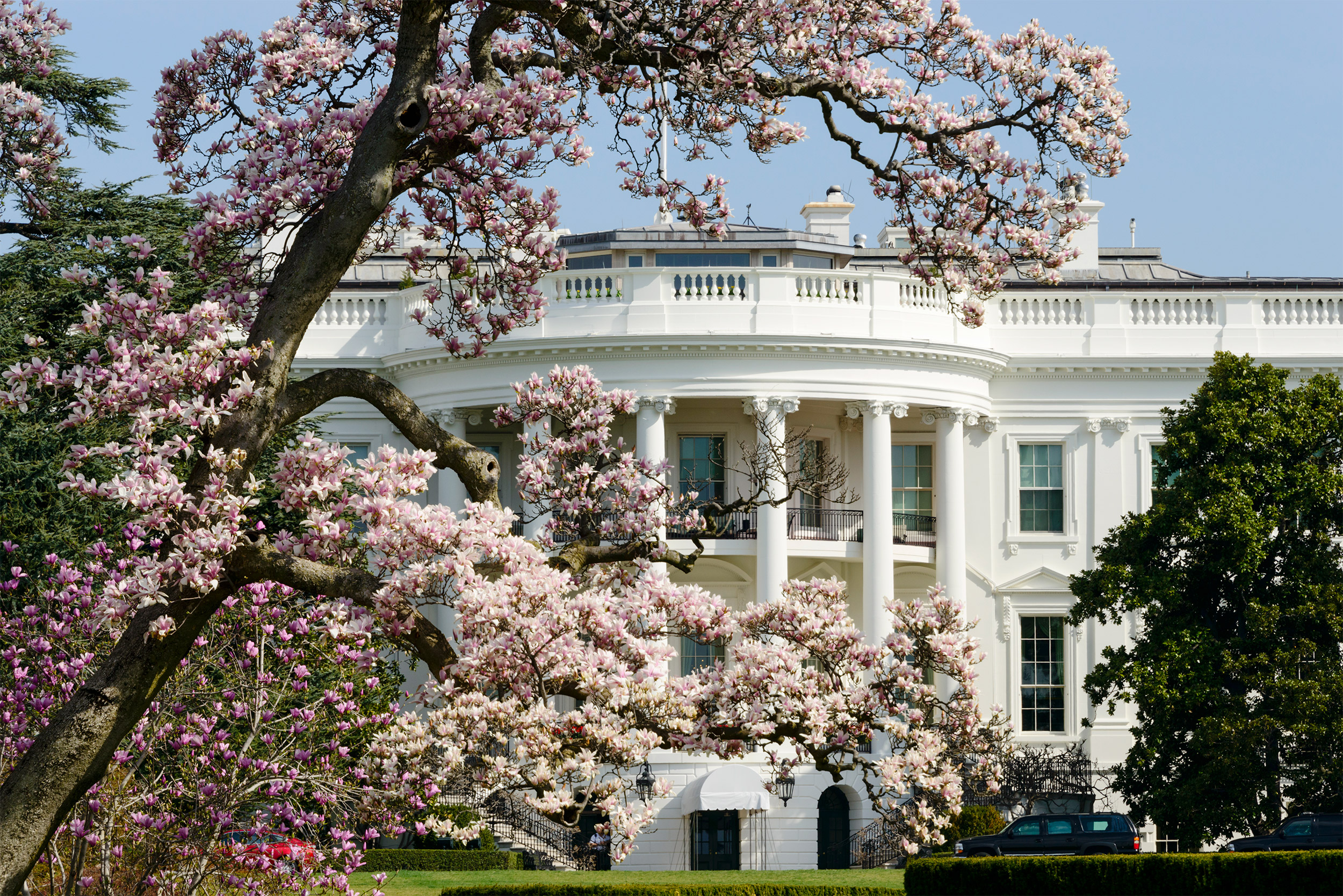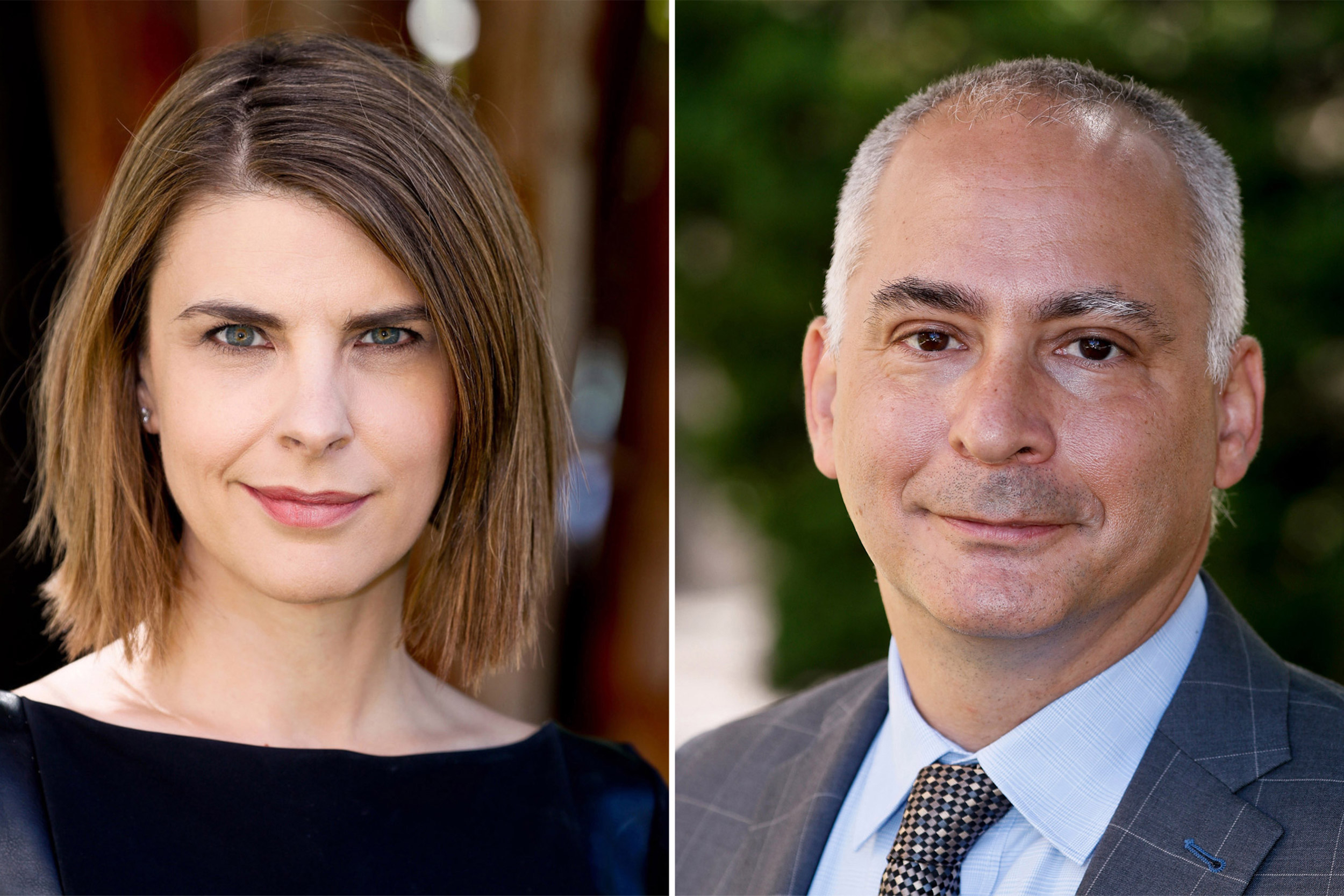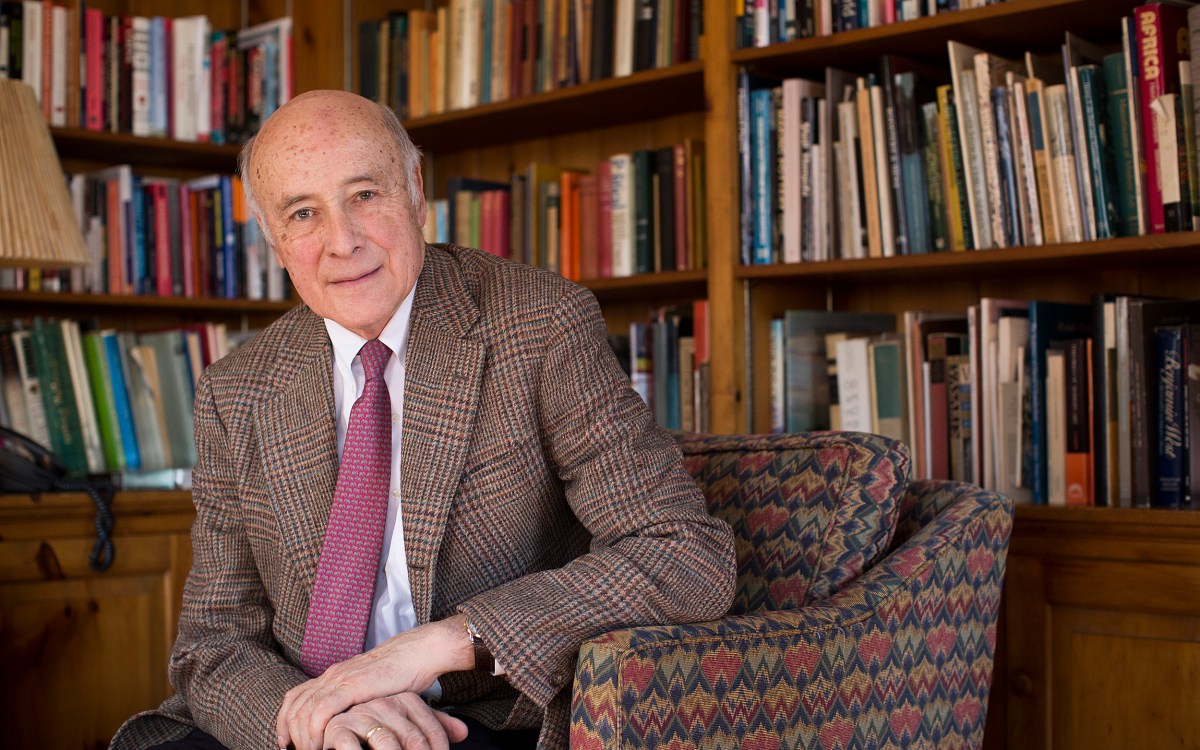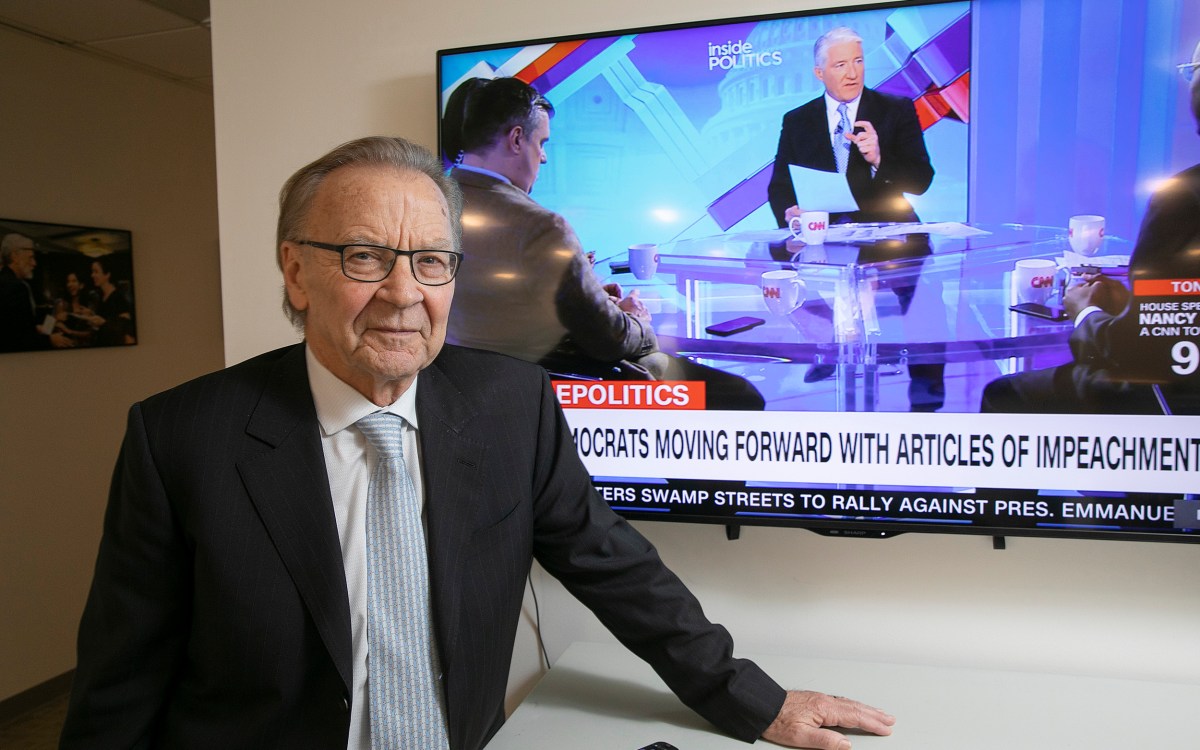
Editors of Lawfare discuss how Donald Trump’s presidency has set some new precedents for the office.
iStock
Has Trump remade the presidency?
Authors Wittes and Hennessey say he’s bucked norms and expanded power, but whether others will follow his lead is unclear
Senators remain generally divided along party lines on whether President Trump should have been removed from office for abusing power and obstructing Congress. But most would agree that Trump has ignored long-established norms and customs and expanded the authority of the presidency. The Senate voted Wednesday to keep him in office, where he will continue to remake the presidency. Will those changes last beyond his tenure? In a new book, “Unmaking the Presidency,” Susan Hennessey, J.D. ’13, and Benjamin Wittes argue that power shift has been underway since his inauguration. Trump is not just flouting convention, they argue. He’s reimagining and reshaping the American presidency in profoundly radical new ways. Hennessey is executive editor of Lawfare, a popular blog for national security and legal analysis. Wittes, the site’s editor in chief, is a fall 2019 lecturer on law at Harvard Law School (HLS). He co-founded Lawfare in 2010 with Jack Goldsmith of HLS and Robert Chesney, who teaches at the University of Texas School of Law. Hennessey and Wittes spoke about Trump’s anticipated upcoming acquittal in the impeachment proceedings, how he’s “unmaking” the office, and what it could mean for the country.
Q&A
Susan Hennessey and Benjamin Wittes
GAZETTE: Having dispatched with the one tool Congress has available to rein in a renegade president — impeachment — and survived the one thing Trump worried about — his presidency ending early — does acquittal make Trump effectively the most powerful president in history?
HENNESSEY: That’s a difficult question to answer, in part because there’s two distinct stages to it. There’s the period of time after the presumptive acquittal at this point, and the next election or when he leaves office. And then there’s a period after [the vote]. So if Donald Trump were to be reelected, that would be a pretty strong statement by the American public that having laid bare his use of executive power and the particular abuse of executive power we see in the Ukraine scandal, that would be the American people ratifying it and saying “We’re OK with this, and we’re OK with the way Trump uses the powers of his office.” Then I think we would have to describe him as one of the least constrained presidents that we’ve seen in modern American history.
The trickier question is: What does this mean for the period between acquittal and the election? Certainly, this is an indication and a statement by the United States Senate that impeachment in our current political climate is not a genuine remedy; it’s not a genuine check on the president. It’s not an actual mechanism for impartial justice, as the Senate oath requires. It’s instead a raw measurement of how many members of the president’s own party happened to sit in the Senate at a particular time. I think that’s a little alarming. It certainly is less constrained than we would have imagined the office to be in the past. But that doesn’t mean that it’s totally unconstrained because, of course, whatever Trump engages in between now and the election, and even if he doesn’t up the ante, as is his typical pattern, if there was a strong electoral repudiation, not just of Trump, but also of Republican members of the Senate, particularly members who have voted to acquit the president, then I do think we would see a rebalancing as the next president takes office. So the verdict is out. Ultimately, the November election is going to be sort of the final statement.
WITTES: You asked will he be the most powerful president ever. We’ve had presidents who had overwhelming legislative majorities. We’ve also have presidents in a couple of cases who were commanding armies that were occupying the territory of states. So we’ve had presidents who were operating in environments that were extremely permissive, which do not exist now. What he will become Wednesday [the day of the Senate vote] is a president to whom the Senate has said, “We don’t care if you do these things.” And that is a different kind of unconstrained.
GAZETTE: There’s been a lot of talk by both Democrats and Republicans about precedents. But many elements of prior presidential impeachments, including the Nixon proceedings, were ignored or broken from with Trump’s impeachment and trial. Does this set a precedent or is precedent only as good as the number of votes a president has in his/her pocket?
WITTES: All impeachments set precedents, and no precedents are binding. On the one hand, absolutely it sets a precedent. It sets a precedent that will be cited just as a lot of the other cases of past impeachments were cited in this one. And if a future Senate feels differently about presidential behavior than this one did about this one, they won’t be constrained for a moment by the way the Senate handled it this time. That said, I do think there’s a nonlegal precedent that is set here, which is when a president behaves a certain way and the system tolerates it, it becomes part of our expectations of the way presidents sometimes behave. And so it’s the nonlegal precedents that, to me, are much more important. That a president said I’m going to shake down a foreign head of state for domestic political favors, and the Senate kind of shrugged, and that means a large number of Americans kind of shrugged, and this man will be on the ballot in the fall — that strikes me as an important precedent, not in a legal sense. It’s just a precedent in terms of our expectations of what is OK or tolerable for a president to do.
GAZETTE: You posit that by intentionally pushing boundaries and violating historical norms, Trump is reshaping the presidency in a way that reflects his personality, his preferred style of management and leadership and personal objectives. What do you mean when you write that Trump’s is an “expressive presidency”? What is he doing that is so radically different than what other presidents have done or tried to do?
“One of the benefits of a unitary executive is not just decisiveness of action, but also accountability. You know who is ultimately responsible for everything.”
Susan Hennessey
WITTES: The thesis is that Trump has put on the table a vision of the presidency. People sometimes balk at that idea … It seems to be giving him too much credit. But I think if you violate norms as consistently as he has, and across as many different areas in a reasonably consistent fashion, you’re actually proposing something new. And we argue what Trump is proposing is a vision of the presidency in which its traditional management functions, its traditional executive functions, its traditional policymaking functions and supervisory functions are all subordinated to what you might call the “vanity plate” element of the presidency — going out and announcing things, the public speaking, the rallies, Twitter, the impulsive interviews. And what these elements have in common is that they are expressions of character and of the personality of the individual, rather than of the office or the country. It involves a certain merging of the office’s interests with the person’s interest, and that kind of personalization of power is something different from what we have come to expect in the traditional presidency.
GAZETTE: In the book, you argue the Trump presidency provides the country all of the downsides of both conceptions of executive power — unitary and pluralistic — but none of the upsides. How so?
HENNESSEY: One of the unique features of the American executive and the American constitutional system is we have a unitary executive. There’s just one president. Whenever we talk about federal agencies and federal officials, what we’re really talking about is a bunch of people whose job it is to carry out the will of the president. The president is the head and everybody else is just his arms and fingers, as a formal manner, and that’s hugely empowering. It allows for this really robust and muscular and strong executive to be able to oversee this sprawling bureaucracy. One of the benefits of a unitary executive is not just decisiveness of action, but also accountability. You know who is ultimately responsible for everything. The buck stops here. That’s a feature that’s both empowering and also constraining about our system. Everybody knows who’s ultimately responsible for Obamacare. Everyone knows who ultimately is responsible for the second Iraq War. There are not debates about what lower officials made those decisions. The president made the decision when the president is the person who is accountable for that.
What we’ve seen occur over Trump’s presidency is … a fracturing of the unitary executive. We see various Cabinet officials openly contradicting the president. We see [the Department of Justice] going into court and saying, “Yeah, just ignore what the president tweeted, or ignore what the president said. He didn’t really mean it.” This notion “the president speaks for the executive branch, the president is the executive branch,” is [starting] to fracture. That might be seen by people as a good thing to people who don’t agree with the president’s policies. The problem is that it also undermines accountability. We see Trump trying to take advantage of this by pointing to a “deep state.” Anytime something goes wrong, we don’t have the president coming out and accepting accountability and responsibility. Instead, we have him blaming people who work for him for having turned against him. And so, that’s an area in which this fragmenting of the unitary executive ends up diminishing presidential accountability and democratic accountability over time. And whenever you match that with some of the other unusual features of Trump’s presidency, for example, his tendency to lie, his unwillingness to hold routine press briefings, you get into a situation in which it’s really difficult for some of our basic processes of democratic accountability and transparency to function in even a minimal way.

GAZETTE: The framers envisioned the dangers of an imperial president, but relied on men of “civic virtue” to seek office and thought that the checks-and-balances dynamic, as well as the Electoral College filtering process, was a bulwark against that. They believed the branches would be loath to allow another branch to usurp their power, and Congress and electors would put forward Alexander Hamilton’s “man of prudence and good sense.” Is Trump outsmarting them all and rendering the guardrails that were supposed to prevent an imperial president — the oath of office, separation of powers, impeachment, nepotism, etc. — moot or grossly insufficient?
WITTES: The founders did not anticipate two factors of our current life that Trump has exploited significantly. The first is they imagined that we were going to be operating without party, and Trump has really relied on the almost parliamentary quality of the Republican Party in its discipline. The second factor is the Electoral College. The founders imagined the Electoral College would be a bulwark against a demagogue. And, in fact, what happened was the opposite: The Electoral College, over the wishes of a majority of the population, ushered in a demagogue. And so, whether Trump imagined it, that gets to the question of how much credit for theorizing you want to give him. He certainly is the beneficiary of some cracks in the system that weren’t imagined at the time the Constitution was written and, in fact, some things the Constitution was very specifically designed to accomplish.
GAZETTE: You say Trump has challenged some long-held traditions and norms and shaken up the office in ways that might invigorate the presidency, bring it into the 21st century. His use of language, speech, you note as novel. Which changes to the office have been positive? Which are most likely to last? And which will only survive with Trump because he’s a sui generis president with a very specific political ecosystem around him and will disappear once he’s off the stage?
WITTES: I cannot say that any of the changes to the presidency have been positive. I can say … the fact that so many people feel like the presidency is so remote that they actually feel attracted to a presiden[t] that is constantly talking to them, that is constantly entertaining them, does raise a question as to whether the traditional presidency was a little bit too elevated in the way people felt that it was communicating with them. There’s a lot of features of the traditional presidency that I would use words like “dignified” or “civil” or “respectable,” words that I would attach a positive balance to. But what Trump has shown is that a lot of people attach negative words to that, “boring,” “pompous,” “elite.” Over the long term, those of us who believe in the traditional presidency are going to have to figure out a way to make it more immediate or more compelling to people, hopefully without the crass and vile aspects of the Trump presidency. I do think there probably are important lessons to learn from the fact that there are so many people who feel so alienated from the institution that this is possible.
GAZETTE: If voters reject this new presidency in November, you say there will be a lot of questions and work to be done to restore public trust and raise the level of integrity and expectations for the next officeholder and that it’s unclear whether the law is the tool to insulate the office from future Trumps. Can you explain?
HENNESSEY: There are a lot of areas that are ripe for legislation — for example, legislative requirements that presidents divest from personal business holdings, transparency requirements. There’s probably a lot of work that can and should be done in the legislative space to restore and reinforce constraints around the American presidency. That said, there are a number of areas in which Trump has demolished norms that you can’t really imagine recreating through laws. There’s going to be a genuine open question for the next occupant of the office. Let’s imagine that a Democrat assumes office on Jan. 20, 2021. That person is going to have some choices to make that prior American presidents have not been able to choose. That person is going to be able to decide whether or not they should hold daily press briefings. And their aides might say, “It’s been shown that you can get away with not having White House press briefings, so let’s only do it once a week or once a month, and they’ll thank us for it.” Unless you have the next president come in and say, “No, I’m committed to this notion of accountability and transparency even when it’s inconvenient to me, and I’m going to restore this norm.” Or saying “Chris Wray is a perfectly a nice person and he may be a perfectly fine FBI director but he isn’t my FBI director.” President Trump has shown that this 10-year legislative constraint for the term for the FBI director is completely meaningless. The next president is going to have to decide: Do I care enough about this idea of a 10-year term for an FBI director and the embedded idea within that of independent law enforcement and the idea that chief law enforcement officers are not purely political appointees, and that is this notion of distance and independence is a really important one, that they’re going to self-constrain whenever it’s their chance to make that decision? That’s going to be the moment in which we see whether or not the presidency returns to mean, restores our expectations, or if it has been changed forever.
GAZETTE: Won’t that be primarily a political calculation? People see what worked and what aspects paid a price with voters and go from there?
WITTES: It is largely a political question in the sense that there is nothing like a demonstration project that something works and that you gain politically to incentivize other politicians to engage in the same behavior. But there’s also another element which is not political. It’s just imaginative. Trump has done a lot of things that other presidents never imagined doing. It wasn’t like they considered it and said, “Oh, but that would be politically ruinous.” They simply never imagined having a Twitter stream in which they would attack people and say whatever’s on their mind and give television reviews and talk about public servants. And so one of the things that happens is when your imagination expands to include a set of behaviors, then you have to decide “This is the one I will not engage in; this is the one I really won’t engage in; this is the one maybe I’ll keep for a rainy day; this is the one I like.” And so those decisions are political, but he’s just expanded the realm of the possible. The menu is much longer, the list of what you choose may be principally conditioned by political considerations, but what’s on the list of options is a whole lot longer than it was three years ago.
This interview has been edited for length and condensed for clarity. Hennessey and Wittes will discuss the book with Jack L. Goldsmith, Henry L. Shattuck Professor of Law at Harvard Law School, Tuesday evening at the Brattle Theatre in Cambridge.







